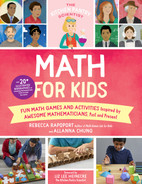FOREWORD
The Kitchen Pantry Scientist series is designed to make the STEAM disciplines—science, technology, engineering, art, and math—interesting, interactive, and memorable by combining storytelling with hands-on learning. After learning about the life and work of a diverse group of influential figures, readers can explore the concepts they examined through creative experimentation. This interaction between text and tactile experience introduces STEAM concepts in a dynamic new way.
I am thrilled that Math for Kids has joined Chemistry for Kids, Biology for Kids, and Physics for Kids as part of this series. Modern science depends on observation and measurement. Without numbers, science as we know it today would not exist.
Math is the language of science, technology, and engineering and can be used to help describe our universe and almost everything in it. In the fields of physics, biology, and chemistry, scientists make assumptions (educated guesses) called hypotheses, which are based on limited observations or evidence. Once a hypothesis is made, it can be tested by experimentation, which involves keeping a record of observations, often using numbers and calculations. In the laboratory, simple math is important for everything from mixing up chemical solutions and counting cells on a microscope slide to deciding whether collected data is significant. Scientists use calculations to make predictions about weather, pandemics, and even the expansion of the universe.
In The Kitchen Pantry Scientist: Math for Kids, Rebecca Rapoport and Allanna Chung creatively explore the lives and accomplishments of twenty-two important mathematicians. To spark further exploration, a step-by-step hands-on activity is paired with each math personality.
From Hypatia to Shing-Tung Yau, Math for Kids tells the stories of mathematicians throughout history and around the world, accompanied by beautiful illustrations. For example, while learning about “mathemagician” Persi Diaconis, readers will read that a fifty-two-card deck needs to be riffle (standard) shuffled seven times to be considered truly randomized, and then try an astonishing card trick. Projects range from simple to complicated, offering on-ramps for learners of differing interests and abilities. Logic puzzles, paper-folding challenges, and games immerse learners and make the math engaging rather than intimidating.
The Indian mathematician Shakuntala Devi once said, “Many go through life afraid of numbers and upset by numbers. They would rather amble along through life miscounting, miscalculating and, in general, mismanaging their worldly affairs than make friends with numbers.” Rapoport and Chung teach us to make friends with numbers.
—Liz Lee Heinecke
